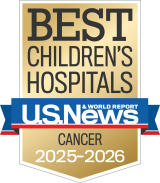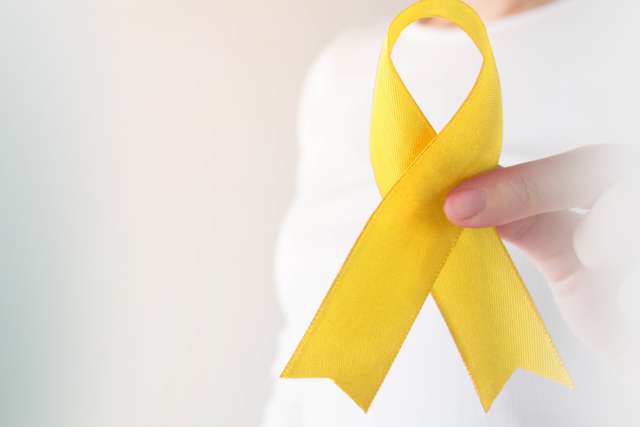Pediatric Cancer
Pediatric cancers can affect the whole family. We offer children leading-edge pediatric cancer treatment and support in a family-friendly environment. We focus on their care so they can focus on being kids.


Why choose UCLA Health for your child's cancer care?
We understand that finding out your child has cancer can be devastating for the entire family. That's why our team of pediatric cancer specialists surrounds you with the warmth and compassion you need to make it through each day. Our experienced specialists are passionate about discovering new pediatric cancer treatments and cures for every type of childhood cancer.
UCLA Health's Division of Pediatric Hematology Oncology is part of two renowned institutions: UCLA Mattel Children's Hospital and the UCLA Health Jonsson Comprehensive Cancer Center. We are:
Nationally recognized: U.S. News & World Report consistently ranks UCLA Health hospitals among the best in the nation. Our pediatric cancer program is ranked among the country's best for childhood cancer.
Focused on your family: We help your whole family cope with the emotional burden and stress that come with a pediatric cancer diagnosis. While delivering effective treatments and innovative therapies, we focus on your entire family's well-being.
Committed to innovative research: Besides the most advanced diagnostics, treatments and supportive care available, UCLA Health strives to bring our pediatric patients newer, more effective discoveries.
Our services
From diagnosis to treatment and beyond, our caring specialists provide comprehensive services including:
Pediatric cancer diagnosis
Your child's care team may order one or more diagnostic tests, depending on your child's symptoms:
Complete blood count (CBC): A blood test taken to check for low levels of red and white blood cells and platelets.
Advanced imaging: Tests that include X-rays and imaging studies such as CT scan, MRI, positron emission tomography (PET) scans and bone scans.
Biopsy: A procedure to extract tumor cells and examine them under a microscope.
Bone marrow aspiration (biopsy): A test performed to take bone marrow fluid and tissue from the hip. We do this to check for blood cancers, such as leukemia and lymphoma.
Spinal tap (lumbar puncture): A test in which a specialist removes cerebral and spinal fluid by inserting a needle between two vertebrae in the lower back . Our lab examines the fluid and checks for the presence of cancer cells.
Pediatric cancer support
Surrounding your child with a strong support system is vitally important. UCLA Health offers:
Child life specialists: Health care professionals who provide support to children and their families. Child life specialists help reduce stress and anxiety that often accompany a pediatric cancer diagnosis and cancer treatment.
Simms/Mann- UCLA Center for Integrative Oncology: Our center offers a supportive community to help ease the burden of cancer. We can help your family address the challenges you may face throughout your child's cancer care journey. Explore our services.
Cancer genetics
Our cancer genetics experts evaluate inherited risk factors that make some children more susceptible to certain cancers. Knowing about a specific genetic risk can help doctors more precisely tailor a treatment plan that is optimal for your child. Learn more about the cancer genetics program at UCLA Health.
Pediatric cancers we treat
We are at the forefront of pediatric cancer diagnostics, treatment and care. We treat all types of childhood cancer, including:
Blood cancers: Cancer that typically begins in the bone marrow, where blood cells are made. The two main types of blood cancer are:
Leukemia: The most common type of childhood cancer. It appears in the blood or bone marrow. Acute lymphocytic leukemia (ALL) is the most common type of leukemia in children. Learn more about leukemia.
Lymphoma: A cancer that forms in the immune system's white blood cells, called lymphocytes, or tissues. There are two main types of lymphoma: Hodgkin lymphoma and non-Hodgkin lymphoma. Learn more about lymphoma.
Brain and spinal cord tumors: The second most common form of childhood cancer. Treatments vary widely since there are many different types of brain and spinal cord tumors. Learn more about pediatric brain tumor treatment options at UCLA Health.
Neuroblastoma: A rare cancer that begins in immature nerve cells. Neuroblastoma is more common among children under 10 years old.
Osteosarcoma and Ewing sarcoma: Bone cancers that appear in children of all ages. Osteosarcoma is generally found in the arm and leg bones, while Ewing sarcoma is commonly found in the chest, hip or shoulder blades. Both cancers cause bone pain and swelling.
Rhabdomyosarcoma: A rare cancer that begins in the cells that grow into muscles.
Retinoblastoma: A rare form of eye cancer that occurs in young children.
Wilms tumor: A rare cancerous kidney tumor that develops in young children.
Treatments we offer
From nonsurgical options to advanced surgery and cellular therapies, UCLA Health offers the full range of cancer treatments for your child. Our pediatric cancer treatments include:
Chemotherapy: Powerful drugs that kill cancerous cells. Depending on the type of childhood cancer, chemotherapy may be used alone or with other treatments.
Radiation therapy: The use of high doses of radiation to shrink cancerous tumors. Radiation therapy is a common treatment for pediatric cancers.
Immunotherapy: Therapies that activate your child's immune system to fight against the cancer.
Targeted therapy: Oral medications that target specific mutations or cell functions to slow down or stop cancer cell growth.
CAR T-cell therapy: A groundbreaking immunotherapy used in hard-to-treat blood cancers. With CAR T-cell therapy, doctors take a blood sample, extract the T cells and send them to a lab where they are programmed to recognize cancer cells. The modified T cells are later infused back into your child's blood, where they target and destroy cancer cells.
Bone marrow transplantation: A treatment that introduces healthy stem cells into the body. These stem cells encourage new bone marrow growth and rebuild the immune system. Children with cancers such as leukemia, lymphoma and brain tumors often need a bone marrow transplant.
Surgery: Performed to remove tumors. Surgeons use minimally invasive techniques whenever possible.
Meet our team
At UCLA Health, our pediatric hematology-oncology staff delivers family-centered care. We focus not only on your child's needs, but also on your family's needs to provide comprehensive pediatric cancer support.
Contact us
Call 310-825-0867 to request an appointment with a pediatric cancer specialist at UCLA Health.
Find your care
We approach childhood cancer like the future depends on it — because it does. For more information, connect with a cancer care specialist at 310-825-0867.
